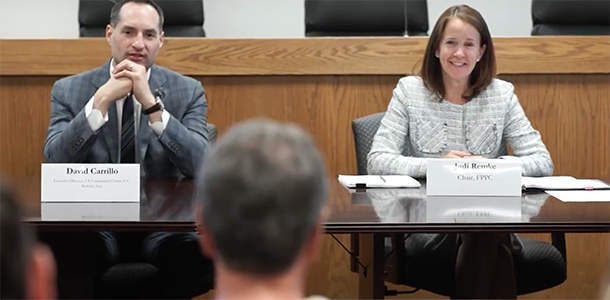
FPPC Chair Jodi Remke (right) and David Carrillo, Executive Director of the California Constitution Center at Berkeley Law, listen to attendee at public discussion in Sacramento. (Photo Credit: Jeff Moates/CA Fwd)
“This is a good opportunity to have your voice heard,” said Kelli Shope, deputy ethics officer at Metropolitan Water District, talking about public forums convened to learn about potential changes to California’s Political Reform Act (PRA). Shope, along with many of her governmental ethics colleagues joined lawyers, public officials, university staffers and some members of the general public for the second of three public discussion sessions.
The PRA was enacted in 1974 as a response to the nation’s Watergate scandal and is widely known for establishing incredibly rigorous ethics guidelines for elected and public officials in California.
Those who attended the earlier sessions in Sacramento and Los Angeles have lauded the transparency of the process and the drive to include input from a wide range of concerned parties.
“They seem to really be interested in hearing from all of us,” Shope said. A graduate of Pepperdine Law School, Shope has referred to the Political Reform Act nearly every working day of her career, starting with her role on the City Ethics Commission in Los Angeles.
“In our office we’re charged with advising officials in compliance. It’s good for us to stay on top of the changes that are coming,” Shope said of her decision to attend the public session.
Don Garcia, chief of the Los Angeles County Conflict of Interest/Lobbyist Division, concurs. Since 2004, he has worked almost daily with the PRA. “I’m constantly helping people who want to do it right,” he said.
His background as a lawyer helps him navigate the language and the sometimes complex structure of the current document, but he believes it shouldn’t take a law degree to comprehend the rules that govern ethical behavior in politics. “The public should be able to understand all of it,” said Garcia.
Shope praises the intent of the act but she, like so many others, is quite familiar with the difficult-to-read reality of the document. “There would be some instances where you feel like you’re kind of having to guess and give it your best effort,” she said.
The herculean process of revising the PRA is spearheaded by the Fair Political Practices Commission in partnership with law students from UC Berkeley and UC Davis and California Forward.
The overhaul is primarily intended to create a more readable document that is well organized and Garcia thinks that goal is attainable. “It’s a little easier to read and a little easier to comply,” and “the way the sections are put together is helpful,” he said.
The current draft under discussion is the result of revisions recommended by law students from UC Berkeley and UC Davis. Utilizing students is an approach that takes advantage of the fresh eyes and bright minds from two of the best law schools in the country.
Because the PRA is so important to his work, Garcia is pleased with the participatory nature of the project and his office will be submitting an idea in writing for consideration. He encourages others to attend the final meeting to get informed on the process and lend their ideas, no matter how small.
“Everything you do with the PRA affects our work,” Garcia explained, noting the numerous incremental changes he’s seen over the years. “Even the smallest changes impact us,” Garcia said.
To submit formal comments on the revised draft, there is still time to read the draft and submit them on the Public Input page of the Revision Project during this first round of public comment.

